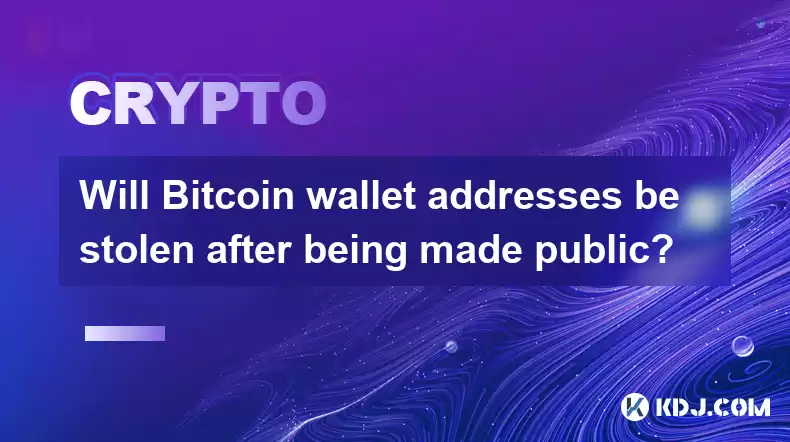-
 bitcoin
bitcoin $87959.907984 USD
1.34% -
 ethereum
ethereum $2920.497338 USD
3.04% -
 tether
tether $0.999775 USD
0.00% -
 xrp
xrp $2.237324 USD
8.12% -
 bnb
bnb $860.243768 USD
0.90% -
 solana
solana $138.089498 USD
5.43% -
 usd-coin
usd-coin $0.999807 USD
0.01% -
 tron
tron $0.272801 USD
-1.53% -
 dogecoin
dogecoin $0.150904 USD
2.96% -
 cardano
cardano $0.421635 USD
1.97% -
 hyperliquid
hyperliquid $32.152445 USD
2.23% -
 bitcoin-cash
bitcoin-cash $533.301069 USD
-1.94% -
 chainlink
chainlink $12.953417 USD
2.68% -
 unus-sed-leo
unus-sed-leo $9.535951 USD
0.73% -
 zcash
zcash $521.483386 USD
-2.87%
公开后,Bitcoin钱包地址会被盗吗?
Bitcoin wallet addresses cannot be stolen as they are public and do not contain private info; security relies on keeping the private key secret.
2025/04/18 22:49

Bitcoin钱包地址是用于发送和接收Bitcoin的唯一标识符。它们通常是长长的字母数字字符,在区块链上公开可见。在加密货币用户中,Bitcoin钱包地址是否可以被盗是是否可以被盗的问题。为了解决这个问题,重要的是要了解Bitcoin地址,其安全性以及与之相关的潜在风险的性质。
什么是Bitcoin钱包地址?
Bitcoin钱包地址是一串字符串,代表了Bitcoin付款的可能目的地。它源自用户Bitcoin钱包的公钥。当您发送Bitcoin时,您实际上是将硬币的所有权从一个地址转移到另一个地址。 Bitcoin地址旨在公开共享,因为它们不包含可直接用于访问资金的任何敏感信息。
Bitcoin钱包地址可以被盗吗?
简短的答案是否定的,Bitcoin钱包地址不能被盗。 Bitcoin地址本身不包含任何私人信息,这些信息将允许某人窃取资金。它只是发送Bitcoin的目的地。但是,有一些误解和潜在的风险需要澄清。
关于Bitcoin地址盗窃的误解
一个常见的误解是,如果某人知道您的Bitcoin地址,他们可以以某种方式访问您的资金。这不是真的。您的Bitcoin地址是公开的,当您想获得付款时,它应该分享。您的Bitcoin资金的安全性取决于私钥,该密钥未共享,应保密。
与公共Bitcoin地址相关的风险
虽然地址本身不能被盗,但与您的Bitcoin公开地址有一些风险:
隐私问题:如果您将相同的地址用于多次交易,那么其他人可能会更容易在区块链上跟踪您的活动。这可能会损害您的隐私。
网络钓鱼攻击:如果有人知道您的Bitcoin地址,他们可能会使用它来创建网络钓鱼骗局。例如,他们可以向您发送一封虚假的电子邮件,声称自己是合法服务,要求您出于某种原因将Bitcoin发送到该地址。这里的风险不是地址被盗,而是您可能会被欺骗到错误的地方汇款。
地址重复使用:重用相同的Bitcoin进行多次交易的地址可能会增加交易链接在一起的风险,从而使某人更容易分析您的财务活动。
如何安全管理Bitcoin地址
为了最大程度地降低风险并维持Bitcoin交易的安全性,请遵循以下最佳实践:
为每个交易使用一个新地址:许多现代Bitcoin钱包为每个交易生成一个新地址。这种做法有助于维护您的隐私并降低地址再利用的风险。
保持私钥安全:始终保持私钥,该钥匙用于签署交易并访问您的资金安全和机密。永远不要与任何人分享。
警惕网络钓鱼尝试:要谨慎对任何未经请求的电子邮件或消息谨慎,要求您将Bitcoin发送到特定地址。在采取任何措施之前,请务必验证请求的合法性。
使用多签名钱包:考虑使用多签名钱包,该钱包需要多个私钥来授权交易。这可以为您的Bitcoin持有量增加一层安全性。
生成新的Bitcoin地址的步骤
如果要生成新的Bitcoin地址,请按照以下步骤:
打开您的Bitcoin钱包:在计算机或移动设备上启动Bitcoin钱包应用程序。
导航到接收部分:寻找标有“接收”或“请求付款”的部分。
生成一个新地址:单击一个选项以生成新地址。这可能被标记为“新地址”或“生成地址”。
复制新地址:生成新地址后,您可以将其复制到剪贴板上或以QR码显示。
使用新地址进行交易:为您的下一次Bitcoin交易使用此新地址来维护您的隐私和安全性。
结论Bitcoin地址安全性
总之,Bitcoin钱包本身不能被盗。它们被设计为公开,用于接收Bitcoin。真正的安全性在于保留私钥机密的机密,并遵循最佳实践来管理您的地址。通过了解Bitcoin的性质并采取适当的措施,您可以安全地将其用于加密货币交易。
常见问题
问:如果有人知道我的钱包地址,有人可以偷走我的Bitcoin吗?答:不,知道您的Bitcoin钱包地址不允许某人窃取您的Bitcoin。他们需要您的私钥才能访问您的资金。
问:在社交媒体上分享我的Bitcoin地址是安全的吗?答:尽管在技术上可以安全地分享您的Bitcoin地址,但由于隐私问题而不建议使用。公开分享您的地址可以使其他人更容易跟踪您的交易。
问:我应该多久生成一个新的Bitcoin地址?答:建议为每个交易生成一个新的Bitcoin地址,以维护您的隐私和安全性。许多现代钱包会自动这样做。
问:如果我怀疑使用我的Bitcoin地址的网络钓鱼尝试,该怎么办?答:如果您怀疑尝试进行网络钓鱼尝试,请不要将任何Bitcoin发送到可疑消息中提到的地址。通过官方渠道验证请求的合法性,并向您收到消息的相关当局或平台报告网络钓鱼尝试。
免责声明:info@kdj.com
所提供的信息并非交易建议。根据本文提供的信息进行的任何投资,kdj.com不承担任何责任。加密货币具有高波动性,强烈建议您深入研究后,谨慎投资!
如您认为本网站上使用的内容侵犯了您的版权,请立即联系我们(info@kdj.com),我们将及时删除。
- Exaverse 呼啸而至 Roguelike 场景:恐龙冒险等待着您!
- 2026-02-05 00:30:01
- 大苹果咬:人工智能预测以太坊价格将创历史新高,市场将在波动中航行
- 2026-02-05 01:10:02
- 释放您的优势:MEXC 推荐代码、USDT 奖金和费用折扣的终极指南
- 2026-02-05 01:00:02
- 纽约一分钟导航:2026 年全球加密货币交易费用一览
- 2026-02-05 01:05:02
- 比特币技术分析师警告称,市场动荡可能导致价格下跌
- 2026-02-05 01:00:02
- 大苹果紧缩:随着区块时间激增和难度表盘硬重置,比特币挖矿面临利润危机
- 2026-02-05 00:50:02
相关百科

Bitcoin 的总供应量是多少?
2025-10-10 13:55:11
Bitcoin 的总供应量1. Bitcoin的总供应量上限为2100万枚。此限制被硬编码到 Bitcoin 协议中,如果不对网络共识规则进行根本性改变,则无法更改。 2. 截至目前,已开采超过 1900 万枚 Bitcoin。这意味着通过采矿过程释放的数量不足 200 万。 3. 通过给予矿工的区...

您可以购买 Bitcoin 的一小部分吗?
2025-10-10 18:01:25
了解部分 Bitcoin 所有权1. 是的,您可以购买 Bitcoin 的一小部分。 Bitcoin 的最小单位称为聪,代表单个 Bitcoin 的亿分之一(0.00000001 BTC)。这种可分割性允许投资者参与市场,而不管 Bitcoin 每枚代币的价格很高。 2. 大多数加密货币交易所都支持...

第一次如何购买Bitcoin?
2025-10-21 11:00:49
了解 Bitcoin 及其价值1. Bitcoin 是一种去中心化的数字货币,在点对点网络上运行,无需银行或政府等中介机构。它是由一位名叫中本聪 (Satoshi Nakamoto) 的匿名实体于 2009 年创建的。 2100 万枚代币的有限供应加剧了其稀缺性和价值。 2. Bitcoin的价格根...

为什么Bitcoin被认为是革命性的技术?
2025-08-12 20:29:18
权力下放和消除中央当局Bitcoin背后的核心创新在于其分散式体系结构,从根本上挑战了传统的金融体系。与中央银行或金融机构管理的传统货币不同, Bitcoin在没有单个实体可以控制的对等网络上运行。这意味着交易由节点的分布式网络验证和记录,从而消除了对银行或付款处理器等中介机构的需求。缺乏中央权威会...

为什么Bitcoin被认为是革命性的技术?
2025-08-10 19:42:58
分散的架构和无信任的交易Bitcoin被认为是革命性的,因为它引入了一个分散的建筑,该体系结构在不依赖银行或政府等中央当局的情况下运作。在传统的金融系统中,信任被置于中介机构以验证和记录交易。 Bitcoin通过使用一个对等网络,每个参与者(节点)维护所有交易的公共分类帐的副本,从而消除了这一需求。...

Bitcoin的关键功能是什么?
2025-08-10 02:50:11
权力下放和对等网络Bitcoin最定义的特征之一是它的分散性质。与依靠中央当局(例如银行或政府)的传统金融系统不同,Bitcoin在点对点网络上运行,该网络由分布式节点网络验证和记录交易。这意味着没有一个实体可以控制整个系统。网络中的每个参与者都可以在没有中介机构的情况下直接发送和接收付款。该区块链...

Bitcoin 的总供应量是多少?
2025-10-10 13:55:11
Bitcoin 的总供应量1. Bitcoin的总供应量上限为2100万枚。此限制被硬编码到 Bitcoin 协议中,如果不对网络共识规则进行根本性改变,则无法更改。 2. 截至目前,已开采超过 1900 万枚 Bitcoin。这意味着通过采矿过程释放的数量不足 200 万。 3. 通过给予矿工的区...

您可以购买 Bitcoin 的一小部分吗?
2025-10-10 18:01:25
了解部分 Bitcoin 所有权1. 是的,您可以购买 Bitcoin 的一小部分。 Bitcoin 的最小单位称为聪,代表单个 Bitcoin 的亿分之一(0.00000001 BTC)。这种可分割性允许投资者参与市场,而不管 Bitcoin 每枚代币的价格很高。 2. 大多数加密货币交易所都支持...

第一次如何购买Bitcoin?
2025-10-21 11:00:49
了解 Bitcoin 及其价值1. Bitcoin 是一种去中心化的数字货币,在点对点网络上运行,无需银行或政府等中介机构。它是由一位名叫中本聪 (Satoshi Nakamoto) 的匿名实体于 2009 年创建的。 2100 万枚代币的有限供应加剧了其稀缺性和价值。 2. Bitcoin的价格根...

为什么Bitcoin被认为是革命性的技术?
2025-08-12 20:29:18
权力下放和消除中央当局Bitcoin背后的核心创新在于其分散式体系结构,从根本上挑战了传统的金融体系。与中央银行或金融机构管理的传统货币不同, Bitcoin在没有单个实体可以控制的对等网络上运行。这意味着交易由节点的分布式网络验证和记录,从而消除了对银行或付款处理器等中介机构的需求。缺乏中央权威会...

为什么Bitcoin被认为是革命性的技术?
2025-08-10 19:42:58
分散的架构和无信任的交易Bitcoin被认为是革命性的,因为它引入了一个分散的建筑,该体系结构在不依赖银行或政府等中央当局的情况下运作。在传统的金融系统中,信任被置于中介机构以验证和记录交易。 Bitcoin通过使用一个对等网络,每个参与者(节点)维护所有交易的公共分类帐的副本,从而消除了这一需求。...

Bitcoin的关键功能是什么?
2025-08-10 02:50:11
权力下放和对等网络Bitcoin最定义的特征之一是它的分散性质。与依靠中央当局(例如银行或政府)的传统金融系统不同,Bitcoin在点对点网络上运行,该网络由分布式节点网络验证和记录交易。这意味着没有一个实体可以控制整个系统。网络中的每个参与者都可以在没有中介机构的情况下直接发送和接收付款。该区块链...
查看所有文章





















![Zyn15 的“Metaverse”[w/Coin] |几何冲刺 Zyn15 的“Metaverse”[w/Coin] |几何冲刺](/uploads/2026/02/04/cryptocurrencies-news/videos/origin_69830f9b4af6d_image_500_375.webp)




















































